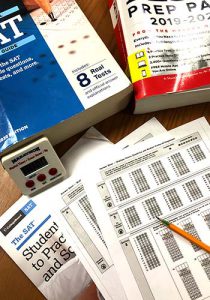Whether you have put away a little or a lot, Marine Military Academy is offering you four smart ways to reduce the cost of your son or daughter’s college education. After all, a bachelor’s degree from a state university now totals about $19,000 a year when you factor in tuition, fees, books and room and board — and costs usually inch up each year!
Investing in your child’s future won’t be cheap, but below are four strategies to help you $ave on your child’s college education.
Four $mart Ways to Reduce College Costs
1. College credit tests
If your high school student has successfully completed an Advanced Placement course, make sure he or she takes the AP exam for that particular subject. An AP exam costs $93 while a course at a state college runs about $900 when you include the fees. The cost of an AP exam is pocket change when you compare the two!
Dual credit courses are free or low cost at high schools. If your high school student is taking a dual credit course, be sure he or she studies hard to pass the course. A passing grade equals college credit.
If your child has already graduated from high school, he or she may still be able to “test out” of a college course through the College Level Examination Program or CLEP. Most colleges will honor CLEP credit, and nearly all colleges offer the exams. At just $80, the CLEP test is an amazing deal!
BEFORE REGISTERING FOR A CLEP TEST, be sure your son or daughter checks the CLEP policy at his or her chosen college to make sure the institution will award credit.
Keep in mind that CLEP tests are only an option if your child has a strong foundation in a particular subject. In other words, if your student had to repeat Spanish I & II in high school, you probably won’t receive a return on that Spanish CLEP test!
2. Community college classes
Even if you planned ahead and invested in a 529 savings plan or a prepaid/guaranteed tuition plan, it’s still a good idea for your child to take his or her core classes at a community college during the summer.
The tuition at community colleges is normally a third the price of state colleges, and most colleges accept the courses from community colleges. Best of all, your son or daughter can earn up to 12 hours of college credit in just one summer! Your child can take summer classes immediately after graduating high school and start college with hours under his or her belt.
BEFORE REGISTERING FOR A COMMUNITY COLLEGE COURSE, your child must check the Transfer Course Equivalency of his or her chosen college to make sure the institution will accept the community college hours.
Money aside, community colleges may be a better place to take some of the more “dreaded” core classes, such as College Algebra or American Literature. Community college classes are normally smaller so the professors can usually offer the extra instruction your child needs for a subject that is particularly challenging to him or her.
3. Low-cost dorm & meal plan
Your child’s housing and meals will cost as much, if not more, than the tuition and fees. To help shave the cost of room and board, have your child choose the least expensive dorm and meal plan.
Asking your child to live in the oldest building on campus will not win you “cool parent” points, but it will probably save you a few hundred dollars per semester. If available, a dorm without air conditioning can save you a minimum of $500 per semester! The lowest-priced meal plan should also help you pocket at least $100 per semester.
If you’re feeling a bit guilty about “going cheap” on a dorm room, you shouldn’t.
If your student is taking the normal 15-hour course load, he or she will hardly be home. When your son or daughter has a break in between classes, he or she will be (or should be) studying in the library. In the evening, after your child has finished any homework or assignments, he or she will probably be out visiting friends. In short, why pay more money for a place where your son or daughter will mostly shower and sleep?
If you’re worried your child won’t have enough to eat, you shouldn’t.
Most college students skip breakfast in the cafeteria and reach for a granola bar so they can sleep longer. If your son or daughter will only eat two full meals a day, why pay extra for three meals in the cafeteria? Plus, nearly all college students stock food in their room and keep a refrigerator. If necessary, you can add more money to your child’s meal plan later.
Finally, urge your child to join the Residence Hall Association right away. By getting involved with RHA, your child has a greater chance of becoming a resident assistant, or RA, at a dorm. Why is being an RA a big deal? An RA receives FREE room and board! (It doesn’t look bad on a resume, either.)
4. Four or Three-Year Graduation
An additional semester or year of college is an extra blow to your bank account, so make sure your child graduates with his or her bachelor’s degree in four years — or less!
To graduate on time, YOUR SON OR DAUGHTER MUST TAKE AT LEAST 15 HOURS PER SEMESTER. Don’t let your child fall into the 12-hour trap!
Because it only takes 12 hours to be classified as a full-time student, many students believe they only need to register for 12 hours, or about four courses, per semester. Unfortunately, too many college advisors also push the 12-hour load instead of the 15-hour load. Students who do not take 15 hours, or about five courses, per semester are setting themselves up for a late graduation.
Also, push your child to take at least six hours, or at least two courses, in the summer. Though the total required hours vary per degree, if your child follows this advice, he or she has an excellent chance of graduating from college in just three-and-a-half years.
If your son or daughter already has some college credit from AP exams, CLEP exams and/or dual enrollment classes, your child may even be able to finish in three years!
The Degree Plan Is Key
BEFORE REGISTERING FOR ANY COLLEGE COURSE, make sure your son or daughter has the degree plan from his or her chosen college.
The degree plan can normally be found on the college’s website under the department of your child’s major. Some colleges refer to it as the Degree Course of Study, Degree Checklist or Degree Catalog, but the degree plan is basically a page that will list all the courses your student is required to take in order to receive his or her college diploma.
Your son or daughter needs to refer to the degree plan every time he or she registers for college courses. It will prevent your child from taking unnecessary courses, and it is the key to helping him or her graduate on time.
Andi Atkinson is the marketing and public relations director for Marine Military Academy. She is a first-generation college graduate and the mother of a college student. She has worked in education for 13 years and holds a bachelor’s degree in journalism and a master’s degree in business.




